
|
Greatest Courtroom Dramas 1990s |
(chronological by film title) Introduction | 1920s-1930s | 1940s | 1950s | 1960s | 1970s | 1980s | 1990s | 2000s | 2010s |
(chronological by title) |
||
| Film Title/Year/Director/Length/Studio, Academy Awards, Brief Description | ||

|
Blood Oath (1990, Australia/UK) (aka
Prisoners of the Sun) During World War II, Ambon Island in Indonesia (known as the Dutch East Indies), a small island just north of Australia, was the location of the Japanese Tan Tai POW camp holding about 1,100 Australian prisoners (known as 'prisoners of the sun'). By 1945, the numbers had dropped to about 300, due to cruel and abusive treatment by Japanese captors. Then, a mass grave was discovered with the bodies of many missing Australian POWs, who were massacred (bayoneted and beheaded). An Australian War Crimes Tribunal was scheduled, to try 91 Japanese officers and soldiers, including sly Vice Admiral Baron Takahashi (George Takei), the main commanding officer (Oxford-educated), and the savage head of the prison camp Captain Ikeuchi (Tetsu Watanabe). The determined Australian military prosecutor was Captain Robert Cooper (Bryan Brown), assisted by Lt. Corbett (Russell Crowe in his film debut). The defense counsel was Shinji Matsugae (Sokyu Fujita). It was a difficult case, because there were no surviving POWs who could testify (not even a 4-man crew on an unarmed reconnaissance plane that was shot down), the camp records had disappeared, and the defendants uniformly denied the charges. Verdict: Takahashi was returned to the island in the custody of an American officer and military observer Maj. Beckett (Terry O'Quinn), who didn't want to convict Takahashi, who had already been promised a post-war job in Tokyo. In the first of three separate trials, Takahashi declared ignorance of the atrocities, and blamed the camp's treatment of POWs on Ikeuchi. He was acquitted and flown back to Japan. Then, Ikeuchi testified that he had no recollection of the mass killings ("I know nothing of any executions!"). Then, a break came when the grave site of the four beheaded airmen was discovered. Eyewitness evidence of Ikeuchi's involvement came when Private Jimmy Fenton (John Polson), an ailing POW about to die, testified about the brutal tortures and executions. Communications officer Lt. Tanaka (Toshi Shioya) took the stand. As a witness against Ikeuchi, he also testified that he had been ordered by Takahashi to kill one of the airman - he had been misled about an alleged court-martial of the prisoner. Another officer Lt. Shimada (Yuichiro Senga) claimed that both Takahashi and Ikeuchi participated in (or knew about) the mass executions. Tanaka was declared guilty and sentenced to death (by firing squad) by the tribunal. Ikeuchi suicidally and ritualistically committed hari-kari before his execution, while Takahashi escaped punishment. |
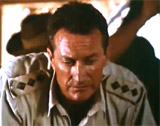
|

|
Presumed Innocent (1990) This crime mystery thriller began with the news of the brutal rape and murder of Carolyn Polhemus (Greta Scacchi) in her apartment - she was the pretty colleague-assistant of chief deputy DA Rusty Sabich (Harrison Ford). Sabich was chosen to lead the investigation - an awkward position since Polhemus had recently been his ex-lover, but had dumped him for Sabich's boss, prosecuting DA Raymond Horgan (Brian Dennehy). Sabich had since reconciled with his wife Barbara (Bonnie Bedalia) who knew about the affair and his mistress. And then Sabich was charged with the murder. There was overwhelming evidence, discovered by detectives, that Sabich had committed the crime. The case was prosecuted by recently-elected, inept County Prosecuting Attorney Nicco della Guardia (Tom Mardirosian) and a new deputy named Tommy Molto (Joe Grifasi), the head of homicide. Top defense attorney Alejandro "Sandy" Stern (Raul Julia) agreed to defend Sabich, while the presiding judge was Judge Larren Lyttle (Paul Winfield). Verdict: The prosecution noted Sabich's fingerprints at the crime scene on a beer glass (that went missing), numerous phone calls between Sabich and Polhemus, Sabich's semen inside the victim, and a matching blood type. Sabich's home revealed Polhemus' blood-stained clothing, and rug fibers. False testimony by Horgan about how Rusty had insisted on handling the investigation hurt the prosecution, with the defense claiming a frame-up and cover-up (in an unrelated bribery scandal involving many of the trial's participants). During the testimony, pathologist/coroner Dr. "Painless" Kumagai (Sab Shimono) reported that the semen sample was strangely mixed with a spermicidal contraceptive, but Polhemus was not using a diaphragm (in fact, she had a tubal ligation). Therefore, the semen must have come from someone else's body, not from Polhemus. These findings caused the case against Sabich to be dismissed by Judge Lyttle. Afterwards, there were numerous plot surprises and twists, including: (1) the unexpected discovery of the beer glass, (2) Sabich's discovery of one of his claw hammers (the murder weapon) covered in dried blood and blonde hair in his toolbox, (3) Barbara's delivery of a shocking revelation to her husband - she confessed that she had killed his assistant, due to jealousy regarding their clandestine affair, and then framed him. Barbara admitted her guilt to her husband when he asked her about it, with a lengthy rationale: "A woman's depressed with herself, with life, with her husband who made life possible for her 'til he was bewitched by another woman. A destroyer. Abandoned, like someone left for dead, she plans her suicide. Until the dream begins. In the dream, the destroyer is destroyed. That's a dream worth living for..." (4) Barbara had committed the murder to make it look like a rape by a "sex-crazed man." She had planted the beer glass with his fingerprints in the apartment, and injected her husband's semen into Polhemus' vagina. Rusty's voice-over ended the film: "The murder of Carolyn Polhemus remains unsolved. It is a practical impossibility to try two people for the same crime. Even if it wasn't, I couldn't take his mother from my son. I am a prosecutor. I have spent my life in the assignment of blame. With all deliberation and intent, I reached for Carolyn. I cannot pretend it was an accident. I reached for Carolyn, and set off that insane mix of rage and lunacy that led one human being to kill another. There was a crime. There was a victim. And there is punishment." |
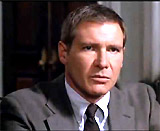
|

|
Reversal of Fortune (1990, US/Jp./UK) "The Case of Claus Von Bulow. An American Saga of Money and Mystery" was the perfect tagline for this biographical mystery-drama about a murder case involving a rich couple in the late 70s and early 1980s, who lived in Newport, Rhode Island. The film was narrated by the deceased, disembodied female protagonist in her hospital bed, and based upon a 1985 book written by the defense attorney. Claus Von Bulow (Jeremy Irons) lived in luxury with wealthy American heiress Martha "Sunny" Von Bulow (Glenn Close), who had become abusively addicted to drugs and alcohol. Because of their icy cold, loveless relationship and near-divorced status, Von Bulow had taken a mistress, Alexandra Isles (Julie Hagerty). At Christmastime in 1979 and also about a year later, the self-destructive, hypoglycemic Sunny was found comatose in her bathroom (with an overdose of insulin). In the second instance, she did not regain consciousness, and under the suspicious circumstances (noted by Maria (Uta Hagen), Sunny's personal maid), Claus was investigated. Sunny's two eldest children (from her first marriage), Alexander von Auersberg (Jad Mager) and Ala von Auersberg (Sarah Fearon), hired an attorney to privately look into the matter. After finding questionable medications (insulin with a syringe) in a black bag in his closet, Von Bulow was charged with two counts of assault to commit murder (injecting her with an overdose of insulin). He was convicted and sentenced to 30 years in prison in 1982. The case was appealed, when brilliant, driven Harvard law professor Alan Dershowitz (Alan Silver), a liberal Jew, and a contingent of law students (recruited from his classes) agreed to try to convince the Rhode Island Supreme Court to "reverse the fortune" of the imperious, unsympathetic European Von Bulow who had an attempted murder conviction. The defendant was out on $1 million dollars bail provided by his ex-employer, billionaire J. Paul Getty. The public and most people thought it was obvious that the haughty, aristocratic Von Bulow was guilty, because he stood to gain $14 million from his wife's death. Verdict: Dershowitz uncovered irregularities, weak physical evidence from sloppy investigative work, faulty logic, and unreliable witnesses (especially star witness maid Maria). And Sunny herself was considered psychologically and physically unstable and may have attempted suicide. The conviction was reversed, and after a new trial, Von Bulow was acquitted. But the tantalizing film (with some black humor from Von Bulow himself) remained very ambiguous regarding his guilt or innocence. Victim Sunny remained in a coma for almost three decades. |
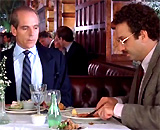 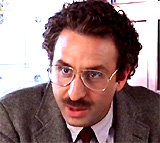 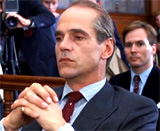 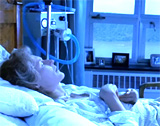
|

|
Class Action (1991) The tagline of this pot-boiling dramatic thriller summarized the plot: "For the plaintiff...Jedediah Tucker Ward. For the defense...Margaret Eleanor Ward. Nothing Personal. It's just Father vs. Daughter in the fight of their lives." Whistle-blowing, 'grand-standing' personal injury lawyer in San Francisco - idealistic and crusading Jedediah Tucker Ward (Gene Hackman), felt he was obligated to protect the public from corporate abuse. He sued Argo Motors on behalf of his plaintiff Steven Kellen (Robert David Hall) whose wife was killed in a car accident. She was in an Argo sedan, the Meridian, when its gas tank exploded in the crash. He claimed safety violations and criminal negligence. Jedediah surmised that the car manufacturer knew that the cost of recalling cars and fixing them to be safe would be higher than paying victims' damages. Argo's defense attorney, representing Argo's president Dr. Getchell (Fred Dalton Thompson), was Ward's estranged daughter, Margaret "Maggie" Eleanor Ward (Mary Elizabeth Mastrantonio), who was working her way up the ladder of a slick corporate law firm. She viewed her father as hypocritical on account of his numerous affairs during his marriage to ailing Estelle Ward (Joanna Merlin). The conservative, by-the-book Maggie was paid by the hour, while her father took the case on a contingency basis (and at a set percentage rate if he won), with assistance from Nick Holbrook (Laurence Fishburne). She was assisted by supervisor-partner Michael Grazier (Colin Friels), a romantic interest. Verdict: The two strong-willed, rival lawyers battled it out, bringing their personal family issues to the courtroom. One turning point came for Maggie when she discovered a previously-concealed, unfavorable engineering report by Dr. Pavel (Jan Rubes), claiming that there was an electrical fault or defect in the Meridian. Its left-turn blinker could cause an explosion if it was in an accident. When she decided to turn over the report to her father, she realized that Michael had destroyed it. During testimony, Jedidah accused Maggie - and her law firm - of destroying the report (did it exist or not?) as part of a cover-up - it became evident that Michael had committed perjury. Jedidah confirmed that the report had existed (by the testimony of a witness) and had been known to both Dr. Getchell and Michael. In the surprise ending, it was revealed that in the middle of the trial, Jedidah and Maggie decided to conspire together to expose both corrupt entities: Argo and Michael - thereby forming a new partnership. |
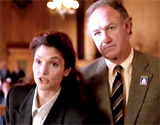
|

|
JFK (1991) Director/co-writer Oliver Stone's complex, provocative docu-film thriller was a controversial, speculatively revisionistic, historical epic surrounding one-time New Orleans DA Jim Garrison's (Kevin Costner) investigation of the John F. Kennedy assassination on November 22, 1963. Its intriguing interpretation was based on the well-publicized and alleged conspiracy theories of the obsessed attorney about the mystery of the death, and on the testimony of a number of unreliable witnesses. Verdict: The trial scene in the last half of the film featured three very memorable segments to disprove the idea that assassin Lee Harvey Oswald (Gary Oldman) acted alone: (1) a detailed analysis of the famous Zapruder film (shot near the grassy knoll) that was subpoened by Garrison's office, but unseen by the American public. The film disproved the Warren Commission's open and shut case of "three bullets, one assassin" - "the time frame of 5.6 seconds established by the Zapruder film left no possibility of a fourth shot." Garrison called junior counselor Arlen Spector's theoretical assertion of the 'Magic Bullet Theory' -- "one of the grossest lies ever forced on the American people," and (2) the scornful rejection of the Magic Bullet theory (the 'official' Warren Commission version of events) which Garrison declared unlikely or impossible, demonstrated with a walk-through, a scale model, and diagrams of the bullet's zig-zag path presented for evidence, and (3) Garrison's impassioned closing-statement monologue scene - a final summation of the case with his damnation of the entire US military-industrial complex and the possibility of a massive conspiracy and coverup (allegedly aided by Clay Shaw (Tommy Lee Jones)) surrounding JFK's assassination. The film concluded with him staring directly into the camera, and addressing the viewing audience (and jury): "It's up to you." |

|

|
Let Him Have It (1991, Fr./UK) The historically-related crime drama's tagline clearly stated: "The shocking story of an unbelievable miscarriage of justice" - the film's title had a double meaning. In the 1950s, 19 year-old Derek Bentley (Christopher Eccleston) was a dim-witted (mental age of 11), reclusive, working class member of a South London family, subject to epileptic seizures due to head injuries suffered in the early years of WWII during the Blitz. In 1952, he had just been released from reform school for petty vandalism, against his father William's (Tom Courtenay) wishes. The illiterate Bentley became friends with 16-year-old small-time hoodlum Chris Craig (Paul Reynolds), who had an imprisoned older brother Niven (Mark McGann). Chris fantasized about being a gangster after watching American crime movies, and collected an arsenal guns. The two were surprised by police officers while breaking into the rooftop of a empty London warehouse. Armed with a gun, Craig opened fire and killed constable Sidney Miles (Robert Morgan), possibly with Bentley's urging, and wounded officer Sgt. Fairfax (Tom Bell). Because of his age, Craig could not be tried as an adult for murder, but Bentley could. The magistrate for the case was pompous, opinionated Lord Goddard (Michael Gough). Verdict: During the trial, the prosecutors were relentless, and the Judge rushed to judgment. Sgt. Fairfax testified that Bentley had incited Craig to shoot the officer by yelling: "Let him have it, Chris!" Both Bentley and Craig denied he had ever said those words (they were probably fabricated) - they weren't incriminating even if they were said. Bentley's lawyer even argued the opposite point: "Let him have it, Chris!" meant "Give him the gun, Chris!" Neither Derek's parents or other character witnesses ever attested to Derek's condition and disabilities. And Derek (and Craig) both stated that Derek was unaware of Craig's gun. Craig was sentenced to indefinite imprisonment (he served 10 years and was released in 1963) for firing the fatal shot. Bentley was sentenced to hang for inciting Chris to shoot and kill, and he was executed in 1953 at the age of 19 (within a month of his conviction). Twelve years after Bentley's hanging in 1965, England's Parliament abolished the death penalty. In mid-1998, a British appeals court posthumously righted one of the most notorious miscarriages of justice in court history by fully exonerating Derek Bentley. The court found that Bentley had been denied a "fair trial which is the birthright of every British citizen." |
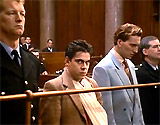
|
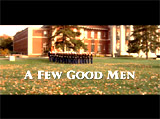
|
A Few Good Men (1992) In this dramatic thriller, two Marines: Lance Cpl. Harold W. Dawson (Wolfgang Bodison) and Pfc. Louden Downey (James Marshall), were accused of "conduct unbecoming" - murdering Pfc. William T. Santiago (Michael DeLorenzo), who was stationed at Guantanamo Bay, Cuba. Unhappy and desiring a transfer to another base, Santiago had ratted on Downey for illegally shooting his pistol into Cuban territory. An illegal 'Code Red' command was ordered to haze Santiago as an extra-judicial disciplinary action, and he suffocated and died when his mouth was gagged and mouth taped. Downey's defense case was assigned to neophyte military lawyer Lt. Daniel Kaffee (Tom Cruise), known for plea-bargaining and conflict avoidance (and not taking cases to trial), assisted by more strident Lt. Cdr. JoAnne Galloway (Demi Moore) and Lt. Sam Weinberg (Kevin Pollak). The defense team traveled to Cuba and met with the base's commander, imperious Col. Nathan R. Jessup (Jack Nicholson). According to Jessup, he ordered Lt. Jonathan Kendrick (Kiefer Sutherland) to protect Santiago, and that he gave a transfer order, to have Santiago transferred to Andrews AFB on a military plane, but Santiago died the night before. Kendrick and Lt. Col. Matthew Andrew Markinson (J. T. Walsh), Jessup's second in command, confirmed Jessup's account, later revealed to be untrue. The prosecutor in the case was Capt. Jack Ross (Kevin Bacon), while the Judge was (Colonel) Julius Alexander Randolph (J. A. Preston). Verdict: Prosecutor Ross proposed a plea bargain, 6 months in prison and dishonorable discharge. But Galloway refused. Down the chain of command, Jessup (who hadn't actually approved a transfer) appeared to have ordered Kendrick to initiate a Code Red, carried out by the two marines. Outside of court, Markinson asserted to Kaffee that a transfer order was never issued by Jessup. In fact, Jessup had doctored flight records and logs that had revealed that Santiago could have left on an earlier flight before his death. Guilty over the cover-up he was involved in, Markinson committed suicide before officially testifying. In the court-martial hearing, Downey asserted that Kendrick had ordered the two to Code Red Santiago, but his testimony was discredited. On the witness stand, an infuriated Jessup was asked about Santiago's transfer order - logically, it was unnecessary if Santiago was not in danger of a Code Red. Also, there was no indication that Santiago had been told about a transfer and was preparing for it. Under intense cross-examination, the arrogant Jessup lost it on the witness stand when he thought officers from Andrews AFB were there to contradict his account, and when he thought he was caught in contradictory lies. Kaffee directly asked: "Colonel Jessup, did you order the code red?" Jessup argued at length ("You can't handle the truth!"), tried to justify his rationale, and then shouted back: "You're god-damn right I did!" He took no responsibility for Santiago's death. The case concluded with Dawson and Downey acquitted of murder, but given a dishonorable discharge. |

|

|
My Cousin Vinny (1992) In the comical film's opening, two NYU college students on their way to UCLA via a southern route: Bill Gambini (Ralph Macchio) and Stan Rothenstein (Mitchell Whitfield), found themselves accused of the murder of a store clerk and robbery at a rural Alabama (fictional Beechum County) convenience store (Sac-O-Suds), where they had stopped. Bill contacted his cousin Vincent "Vinny" LaGuardia Gambini (Joe Pesci) to defend him, not knowing that Vinny (who recently became a lawyer) was an ex-auto mechanic who had no court or trial experience, and had flunked the bar exam six times. Heavy-accented Brooklynite and personal injury lawyer Vinny and his talkative and abrasive fiancee, unemployed Italian-American hairdresser Mona Lisa Vito (Marisa Tomei) arrived in town to defend the boys, and soon faced stern, upright and increasingly-frustrated Judge Chamberlain Haller (Fred Gwynne), who sent Vinny to jail overnight for contempt of court. Verdict: During the trial, the D.A. Jim Trotter III (Lane Smith) produced three eye-witnesses to the crime, and Vinny eventually was able to effectively cross-examine them, especially by debunking witness Sam Tipton's (Maury Chaykin) account of preparing grits in only five minutes. But he needed Mona Lisa to help provide alternate testimony to counteract FBI agent George Wilbur's (James Rebhorn) testimony about automobile tire marks at the scene. Although resistant, Mona Lisa took the witness stand, and produced photos she had taken of the tire marks in front of the store. She claimed the real perpetrators drove a Pontiac Tempest with Positraction, something not installed on the boys' Buick Skylark. Her testimony proved decisive when Sheriff Dean Farley (Bruce McGill) revealed that two youths resembling Bill and Stan were arrested in Georgia - with a stolen Pontiac and the murder weapon. |
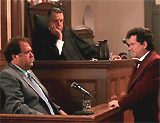
|
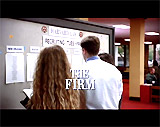
|
The Firm (1993) Based on John Grisham's best-selling 1991 novel of the same name, this lengthy and complex R-rated, legal-related crime thriller (a major blockbuster) starred Tom Cruise as young Harvard Law School graduate Mitch McDeere from humble origins. He was a tax lawyer and CPA who accepted a seductive, Faustian, and lucrative appointment to Bendini, Lambert & Locke, a prestigious and secretive boutique law firm in Memphis, Tennessee, with his elementary schoolteacher wife Abby (Jeanne Tripplehorn). He reported to the head of the firm Oliver Lambert (Hal Holbrook), and his "designated mentor" oily Avery Tolar (Gene Hackman). The firm's main purpose was tax-avoidance for rich businessmen through the formation of limited partnerships and offshore corporations (and shell accounts), mainly in the Cayman Islands. The duped Mitch learned of a series of suspicious deaths after the demise of two of the firm's lawyers, Marty Kozinski and Joe Hodges during an explosive scuba-diving accident. In fact, four out of forty-one lawyers at the crooked firm, Mitch's predecessors, had died in the past ten years, presumably after learning about the firm's criminal associations. During a visit to the Caymans and Avery's vacation home, Mitch discovered a locked closet filled with boxes of files marked "Morolto Ltd." that were prepared by the firm's four deceased lawyers. [Note: The firm's major client was the Morolto family - a crime group from Chicago. The firm was assisting them in massive tax fraud and money laundering.] After the FBI (agent Wayne Tarrance (Ed Harris)) and the Justice Department became involved in investigating a case against the firm and the crime syndicate and were pressuring him, Mitch agreed to cooperate, even though he feared for his life and career. On the island, Abby and helpful secretary Tammy Hemphill (Holly Hunter), the grieving wife of a murdered private investigator (gumshoe Eddie Lomax (Gary Busey)), stole and photo-copied incriminating Morolto files. Playing each side against the other, Mitch was able to have the Moralto family work with him by turning over their billing invoices. He convinced them that he was attempting to expose the firm's illegal over-billing, rather than incriminate them. Verdict: The thriller was mostly a procedural that unraveled the various legal options available to a duped and flawed protagonist attempting to right various wrongs. Although the devious and opportunistic litigator Mitch had aided and abetted the Morolto crime family, the evidence he provided (as a whistleblower) to the FBI guaranteed that the senior members of his corrupt firm would go to prison for decades - for the crimes of mail fraud and massive over-billing. He was able to save his legal credentials, career and license to practice - to avoid disbarment. |
 
|
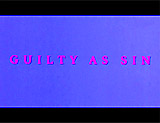
|
Guilty As Sin (1993) In this inferior, preposterous cat-and-mouse dramatic thriller (similar to Jagged Edge (1985)), the plot introduced successful, ambitious and over-confident female criminal defense attorney Jennifer Haines (Rebecca DeMornay) in Chicago, who was dating fellow lawyer Phil Garson (Stephen Lang). She took on the defense of accused murderer David Edgar Greenhill (Don Johnson), a sexually-aggressive womanizer who was about to gain his dead wife Rita's (Brigit Wilson) fortune. Suffering from clinical depression, she had taken a fall from their high-rise apartment window. The film's tagline described the entire setup: "She's finally met her match. He's handsome, wealthy, seductive. A Real Lady Killer." Before the case commenced, Haines employed her longtime, 72 year-old private investigator Moe (Jack Warden) to look into the shady background of her client (Greenhill was found to have previously married older wealthy women who turned up dead). Haines found herself duped and enveloped by her slick playboy client's fixated attentions and stalkings: constant phone-calls, and delivery of dry-cleaning to her office (with dropped hints of a sexual relationship). When Haines requested that Judge (Dana Ivey) remove her from the case, due to Greenhill's unpaid fees, she was declined. She could not have evidence of Haines' past (serial killer) guilt brought to light, constrained by the attorney-client privilege of confidentiality. Haines was assisted by Emily (Norma Dell'Agnese) during the case, while the prosecutor was DiAngelo (Ron White). Verdict: Just prior to Rita's death, she had repeatedly called the police to report her fears, and she had allegedly sent a letter to state authorities fearing she might be murdered by her husband. During the trial, the prosecution (with a handwriting expert) declared the letter phony - it was intimated that it was written by Greenhill himself, to discredit the prosecution's case. In an attempt to betray her client, Haines planted incriminating evidence in his apartment and then tipped off the police with an anonymous phone call. Greenhill was suspicious and caught on to the ploy, and assaulted her boyfriend Phil. To bolster his case at the last minute, Greenhill presented surprise witness Kathleen Bigelow (Barbara Eve Harris) who testified that she was having sex with Greenhill at the time of the crime. The trial concluded with a hung jury and mistrial. In private, however, Greenhill confessed his "guilty as sin" status to Haines, and declared that he knew she had tried to discredit him with planted evidence. In the film's closing minutes, Greenhill confronted and knocked Moe unconscious in an ambush - he had gathered damning evidence of previous wrong-doing. He left Moe and the evidence in the burning building. Haines and Greenhill struggled on a balcony and both toppled over - Greenhill softened Haines' fall and perished, while she survived with serious injuries. |

|
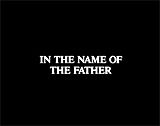
|
In the Name of the Father (1993, Ire./UK/US) The setting of this historical/biographical drama about wrongful imprisonment was Belfast, Northern Ireland in 1974. During a series of IRA (Irish Republican Army) bombing attacks against the British, two explosions occurred at a Guildford pub outside London, killing five and wounding dozens of others. Suspected petty thief and drug user Gerry Conlon (Daniel Day-Lewis) and friend Paul Hill (John Lynch) were charged with the crime and arrested, and held for seven days, although they had a sound alibi on the night of the bombing - they were engaged in a robbery of a prostitute's apartment in London, and speaking to homeless man Charlie Burke (Joe McPartland). The Chief Inspector Robert Dixon (Corin Redgrave), using coercion by torture (and ignoring their alibi), forced the signing of a confession of murder by Conlon and Hill, and two others: Carole Richardson (Beatie Edney) and Paddy Armstrong (Mark Sheppard) - known collectively as the Guildford Four. The group was suspected of being IRA sympathizers. There were seven other related defendants (primarily members of Gerry's extended family), known as the Maguire Seven (one of whom was Giuseppe Conlon (Pete Postlethwaite), Gerry's father), charged with being accessories to the bombing (by bomb-making and terrorist associations). Verdict: The trial was quick and grossly unfair. Although the defendants claimed their innocence, and there was no evidence other than coerced confessions, the Guildford Four were sentenced to life imprisonment. There were sentences of 12-15 years for the Maguire Seven. While father and son, Giuseppe and Gerry Conlon shared a prison cell, the actual IRA terrorist bomber of Guildford, Joe McAndrew (Don Baker) was also incarcerated, and he admitted his guilt to them. 15 years after the Conlons' convictions, compassionate British civil rights lawyer Gareth Pierce (Emma Thompson), who had been called upon by Gerry to defend the Guildford Four (and the Conlons), thus set up the film's plot that was described in its tagline: "Falsely accused. Wrongly imprisoned. He fought for justice to clear his father's name." The defense faced numerous obstacles, but eventually uncovered a private, archived record of Inspector Dixon's interview with Charlie Burke - providing Gerry Conlon with a vindicating alibi. On the stand, Dixon was accused of lying and concealing evidence, forcing the judge to dismiss the charges against both falsely-accused groups. Unfortunately, six of the seven Maguire Seven had already served their sentences, and Giuseppe had already died in prison. Outside the courtroom, Gerry spoke: "I'm an innocent man. I spent 15 years in prison for something I didn't do. I watched my father die in a British prison for something he didn't do. And this government still says he's guilty. I want to tell them that until my father is proved innocent, until all the people involved in this case are proved innocent, until the guilty ones are brought to justice, I will fight on. In the name of my father and of the truth!" The film's postscript stated, in part: "The IRA men who admitted they were responsible for the Guildford pub bombing have never been charged with the offense. They remain in British prisons to this day. Three ex-detectives were acquitted of conspiring to pervert the course of justice after their trial May 19, 1993. No policeman has been convicted of any crime in this case." |

|

|
Philadelphia (1993) Jonathan Demme's milestone film was one of the first mainstream Hollywood films to address the issues of homosexuality and homophobia, in a case of wrongful termination. It was the story of senior law associate Andrew Beckett (Tom Hanks) in a prestigious Philadelphia law firm led by Charles Wheeler (Jason Robards). Although Beckett had been keeping it a secret that he was a gay man suffering from HIV/AIDS, he was chosen to represent High-Line, a high-tech company involved in a copyright infringement lawsuit. During his preparations for the case, he remained at home and papers that he filed at work were temporarily misplaced or lost. Beckett was fired for his sloppy work, although he attributed his sacking to suspicions that he had AIDS, due to an obvious lesion on his face. Although reluctant to represent Beckett at first, personal injury attorney Joe Miller (Denzel Washington), with an intense fear of germs and slightly homophobic, accepted the defense assignment. Belinda Conine (Mary Steenburgen) represented the large Wheeler corporate law firm. Verdict: During the trial held about seven months later, Beckett's health had already deteriorated and worsened, and he was visibly ill. Miller had to prove that Beckett's firm had deliberately hidden his case papers as a pretext and excuse to fire him (after learning of his diagnosis and panicking). Miller would argue that Beckett was protected by the Americans with Disabilities Act. Firm lawyers Wheeler and Walter Kenton (Robert Ridgely) testified that they were unaware of Beckett's illness or visible lesions (and that Beckett had indeed concealed his lifestyle and illness). They claimed that Beckett was fired instead for incompetence and sloppy work. Defense attorney Conine repeatedly suggested that Beckett had invited his illness through promiscuity and was therefore not a victim. In one of the most dramatic scenes, Conine held a mirror up to Beckett's face, illustrating that he had no lesions. However, it was further demonstrated that Beckett had lesions on his chest when he opened his shirt (similar to the one he had earlier on his face). Beckett also confirmed that he had probably acquired AIDS through anonymous sex with a stranger in a gay porno movie house known as the Stallion Cinema. As the trial proceeded, Beckett was hospitalized and near death when the jury came to the conclusion that he was fired because he had AIDS. Beckett was awarded back pay, 'pain and suffering' and compensatory punitive damages, while his law firm promised to appeal the decision. In the final scene Beckett died in the presence of his longtime companion Miguel (Antonio Banderas). |

|

|
Sommersby (1993, Fr./US) Set in the Civil War Reconstruction era, this mystery-romance and melodrama about deceptive identities and impersonation was an Americanized remake of The Return of Martin Guerre (1982, Fr.) starring Gerard Depardieu. Bearded and disheveled John Robert 'Jack' Sommersby (Richard Gere) returned to his home in Vine Hill, Tennessee following seven years of fighting in the War Between the States as a Confederate. The war had ended two years earlier. The presumed-dead soldier approached his officially-widowed wife, Laurel Sommersby (Jodie Foster) and young son Rob (Brett Kelley), although there was some hesitation before they embraced. He claimed that he had just been released from a Yankee POW camp in Elmira, NY. Things about him were suspicious - his reduced shoe size, and the family dog Jethro didn't know him. He was a much different, kinder personality than the abusive, drunken, cruel, callous and bitter husband who had left the broken-down home years earlier. He surprised everyone with a visionary plan to create racial equality. He would divide up his cotton-field landholdings into purchasable tobacco plots for all of the citizens of the economically-impoverished community - making them sharecroppers (former black slaves included), and stirring up the reactionary KKK. One of the family friends who had taken Sommersby's place (when he was presumed dead) was fiancee Orin Meecham (Bill Pullman), who was now jilted and displaced with his return - and Laurel's swelling pregnant belly. Then, Sommersby was arrested by federal marshals for the murder of Charles Conklin in another town, an act committed when he was drunk before he went off to war. During the trial held in Nashville, the presiding black judge was Barry Conrad Issacs (James Earl Jones), while the case was prosecuted by lawyer Dawson (Maury Chaykin), and the defense lawyer was Webb (Ray McKinnon). Verdict: The claim was that Sommersby was caught cheating at poker, challenged by Conklin - and after a struggle, Conklin was shot dead. During the trial, the strategy by the defense lawyer was to argue that the individual charged with the murder was NOT Sommersby. To save his life (although he would still be charged with fraud and military desertion), Laurel testified that she liked the imposter more than her original husband. Defense witness and KKK member Folsom (Paul Austin) identified Sommersby as a fraud - he was really despised con artist and cheat Horace Townsend from Virginia (who defrauded his town out of $1,200, and deserted the Confederate army). At that point, Sommersby fired his defense attorney and took up his own case - to affirm his identity as the real Sommersby. His faced a tough choice: either admit being a lying scoundrel (his real-identity), or be punished for the crime of murder as Sommersby. He cross-examined Laurel and forced her to admit she had perjured herself to save him. He also cross-examined Folsom, forcing him to admit his KKK associations. But Sommersby did not defend himself from the accusation of murder - he was convicted, and sentenced to death by hanging. While awaiting his execution, 'Sommersby' admitted to Laurel that he was indeed Townsend. [In the Union POW camp for four years, he had met the real Sommersby, and decided to impersonate him after learning everything about him. The real Sommersby - after his release from the POW camp - was wounded during a fight in which his opponent was murdered - and soon died.] 'Sommersby' argued that If he sacrificially died as the self-respecting Sommersby, then he wouldn't lose Laurel, his new daughter Rachel wouldn't be considered illegitimate, and the land transfers to his neighbors wouldn't be invalidated. |

|

|
It Could Happen to You (1994) This contrived, dramatic Capra-esque romance was about "A cop. A waitress. A lottery ticket." - the film's tagline. Officer Charlie Lang (Nicolas Cage), a compassionate, generous, and virtuous New York City (Queens) cop, bought a lottery ticket (at the urging of his obnoxious, shrewish and shrill wife Muriel (Rosie Perez)), choosing the number 26 (instead of Muriel's suggestion of 27). During his lunch break at a coffee-shop/cafe with partner Bo Williams (William Pierce), Charlie realized that he didn't have cash to tip the friendly, hard-working, down-on-her-luck blonde waitress, Yvonne Biasi (Bridget Fonda). On a whim, he impetuously offered her 1/2 of his lottery winnings the next day - if he won. As luck would have it, Charlie won the lottery jackpot of $4 million. The next day at the restaurant, Charlie presented Yvonne with a voluntary choice between a double-tip or 1/2 the value of his ticket. She chose the ticket value (and he exclaimed: "A promise is a promise"), assuring herself of his gift of $2 million. The media publicized the lottery results at a press conference - announcing the bargain between Charlie, his reluctant wife, and the waitress. Yvonne was being harrassed by her estranged, sleazy, blackmailing, spend-thrift husband Eddie (Stanley Tucci) who suddenly appeared. Optimistic Charlie had told Muriel, "We should do the right thing," and that he was confident that they would still become rich and famous due to publicity and commercial endorsements. However, there were romantic and legal complications when the materialistic and greedy Muriel suspected Charlie of an affair with Yvonne, and threatened divorce. Muriel was represented by Harvey Hale (Richard Jenkins), while Charlie was defended by Walter Zakuto (Red Buttons). Verdict: During the courtroom trial, Muriel's attorney demanded that the entire $4 million belonged to his client. Charlie would not agree to giving up Yvonne's share. Charlie testified that he and Yvonne were now in love, but had never met before the lottery ticket incident. The jury awarded Muriel the entire amount. Saddened by the verdict, Charlie and Yvonne visited the diner (which Yvonne had bought, but would now lose). Their hard-luck story and generosity, even in the face of disaster, was published by a undercover reporter/photographer named Angel Dupree (Isaac Hayes) (the film's narrator) who was posing as a hungry homeless man and was given food by the couple. In response, the generosity of New Yorkers brought in over $600K to help pay their debts, and they would soon marry. On the other hand, Muriel was swindled out of her money by her new husband, nouveau riche con man Jack Gross (Seymour Cassel). |
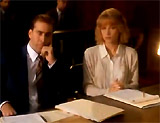
|
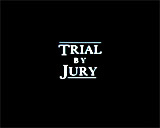
|
Trial By Jury (1994) In this dramatic crime thriller about jury tampering, the tagline described one female juror's motivation to obey the convicted crime boss on trial: "To protect her child from the Mob, she did what any mother would have done. Lie. Deceive. Manipulate." Divorced single mother and small-business owner Valerie Alston (Joanne Whalley-Kilmer) was summoned for jury duty and considered it her civic duty to accept. The case involved ruthless mob boss Rusty Pirone (Armand Assante), being prosecuted for murder by DA Daniel Graham (Gabriel Byrne), and defended by Attorney Leo Greco (Richard Portnow). To ensure a court victory, members of the mobster gang, including corrupt, low-life, disgraced ex-cop Tommy Vesey (William Hurt), forced Alston into a van at her 7-year old son's (Bryan Shilowich) soccer game practice, and threatened to kill her (and her son) if she didn't vote Pirone innocent. While out on bail, Pirone unlawfully entered Pirone's apartment, threatened her with violence if she didn't cooperate, and raped her. Verdict: During the trial, prosecutor Graham's solid strategy was to offer leniency to some of the witnesses (convicts in prison) if they testified against Pirone. Pirone's uncle was persuaded to cooperate when threatened with photographs of himself conducting homosexual acts in prison. However, the intimidated Alston remained steadfastly firm in voting 'not guilty' in the jury room, where she contended that Pirone was set up and that his constitutional rights were violated. Eventually, she convinced three other jurors to vote with her, and Judge Feld (Robert Breuler) declared a mis-trial. To learn how he lost the case, Graham began a personal investigation into the jurors, and zeroed in on Alston. A search of her apartment revealed an incriminating photograph. The mobsters suspected collusion between Graham and Alston, and attempted to murder her (Pirone's hard-bitten, jealous hooker/contract killer Wanda (Kathleen Quinlan) participated in the murder attempt), but didn't succeed when Vesey, who had unexpectedly fallen in love with Alston, saved her, but lost his own life. In the striking conclusion, Alston attempted to seduce Pirone in his country home as a ploy. As he tried to smother her, she knifed him to death - an act of vengeful vigilantism. She told Graham: "You live your life, believing in things like justice and the law. Then someone grabs you off the street in broad daylight. Walks right past the police and tells you that he'll reach out from beyond the grave and kill your son. You don't think about right or wrong, you only think about survival. You do what you have to do." |

|

|
Losing Isaiah (1995) Along the lines of Kramer vs. Kramer (1979), this melodrama was about a vicious custody battle for a boy, and inter-racial adoption. Infant Isaiah was found abandoned in a garbage trash bin in an alley, deposited there by his African-American drug-addicted mother Khaila Richards (Halle Berry). Margaret Lewin (Jessica Lange), one of the white social workers at the medical hospital where Isaiah was treated, adopted the young boy into her family, including her husband Charles (David Strathairn) and sullen, pre-teen 11 year-old daughter Hannah (Daisy Eagan). The child, due to being a crack baby, had developmental issues, including hyperactivity, educational challenges, and emotional problems. However, three to four years later, once reformed birth mother Khaila had been released from prison (for shoplifting) and had freed herself from her cocaine-addiction through rehab, she wanted her son back. She was defended by zealous legal aid attorney Kadar Lewis (Samuel L. Jackson) on a pro bono basis. To defend themselves, the Lewins hired black lawyer Caroline Jones (La Tanya Richardson). The lengthy custody hearing-case, held in a Chicago courtroom with Judge Silbowitz (Jacqueline Brookes), was summarized in the tagline: "Who decides what makes a mother?" Verdict: Mother Khaila testified that she was now qualified to mother Isaiah properly. Cross-examination revealed that she had been a prostitute, but had turned a new leaf - she had taken a job as a nanny and housekeeper for an affluent white couple. A social worker also claimed that Isaiah would be better served with a black parent, while another contradicted that claim, affirming that it would be detrimental if Isaiah left his adoptive parents to whom he was now tightly bonded. Kadar argued that "Black babies belong with black mothers." After further questioning, Margaret was forced to admit she hadn't introduced Isaiah to any black heritage, culture or black friends, and Charles admitted to a damaging secret of being unfaithful. The judge decided in favor of the simple-minded Khaila who didn't consider the consequences of the return of Isaiah. The transition was difficult for Isaiah, and he fought readjusting to a new parent. In the conclusion, Khaila contacted Margaret to have the child returned for the time being, for the best interests of the child. |

|
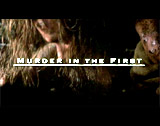
|
Murder in the First (1995) This dramatic thriller, an indictment of the American penal system, its prisons and the miscarriage of justice, was very loosely based upon (or inspired by) the true case of an Alcatraz prisoner named Henri Young in the late 1930s and early 1940s. Orphaned and destitute teenaged Henri Young (Kevin Bacon) was unjustly imprisoned after stealing $5 from a hardware store/post office (this was the film's biggest fabrication - Young was actually a seasoned bank robber-criminal), and soon sent to San Francisco's infamous island prison Alcatraz. In 1938, Young and fellow inmate Rufus "Ray" McCain (David Michael Sterling) failed in an escape attempt (when fellow escapee Ray ratted), and Young was punished with solitary confinement in a rat-infested, icy dungeon for 3 years after being slashed with a straight razor by the sadistic and vicious associate prison warden Milton Glenn (Gary Oldman). Inhumanely treated and almost crazy, he received only a half an hour of daylight per year. Almost immediately after his release in 1941, Young stabbed and killed Rufus with an eating utensil in the neck. He was prosecuted for first-degree murder and destined for the gas chamber. He was defended by boyish-looking, idealistic, recent Harvard Law School grad James Stamphill (Christian Slater), a newbie public defender who had no experience in trial cases. Here's where the film's tagline began to make sense: "One was condemned. The other was determined. Two men whose friendship gave them the will to take on the system." Young was mostly incommunicative and catatonic at first with his crusading legal representative. Crusty and stern Judge Clawson (R. Lee Ermey) allowed Stamphill's ambitious attempt to put Alcatraz on trial for its inhumane treatment of prisoners. Verdict: It was challenging to convince guards
or prisoners to testify against the brutal conditions at Alcatraz.
When Glenn was called to the stand, he couldn't explain why so many
prisoners became mentally insane during his time as warden. Young took
the stand and would not agree to plead guilty to the charges. He feared
returning to Alcatraz and further punishment. The jury's verdict was
'involuntary manslaughter' (unintentional murder) - and they further
called for a full investigation into Alcatraz. Warden Glenn was forbidden
to work in the US penal system. When Young returned to Alcatraz, he
was again placed in solitary confinement, and found dead about 7 months
later in his cell. |
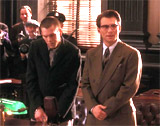
|
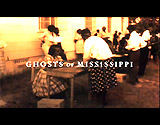
|
Ghosts of Mississippi (1996) Reiner's historical drama was about the assassination of black civil rights and NAACP leader Medgar Evers (James Pickens, Jr.) in Jackson, Mississippi, in June of 1963. He was gunned down in his own driveway, where his wife and three children watched in horror. Bigoted and arrogant white supremacist Byron De La Beckwith (James Woods), with ties to the KKK, was charged with the murder and had been brought to trial twice (both cases led to mistrials and hung decisions of all-white juries). Now, over thirty years later, La Beckwith would again face trial. With the assistance of Evers' determined, long-suffering and anguished widow Myrlie (Whoopie Goldberg) and with evidence of jury-tampering in the previous cases, courageous Assistant District Attorney Bobby DeLaughter (Alec Baldwin) in Hinds County served as the prosecutor for the case. However, it would be difficult since most of the original evidence was missing and most of the witnesses were now dead. It would also take a toll on his political aspirations, cause a flurry of calls and death threats, and jeopardize his marriage to Dixie DeLaughter (Virginia Madsen). Verdict: In 1994, Byron De La Beckwith was found guilty and sentenced to life imprisonment. |
 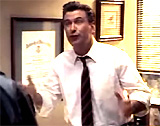 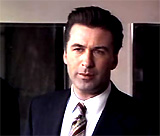
|
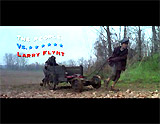
|
The People vs. Larry Flynt (1996) This biographical drama was about the outspoken, unlikely First-Amendment free-speech advocate and publisher of X-rated Hustler magazine, Larry Flynt (Woody Harrelson). It began with a short prologue set in the early 1950s in Kentucky, where young Flynt (Cody Block) was engaged in moonshining. Then, the film jumped ahead 20 years, finding Flynt and his younger brother Jimmy (Brett Harrelson) running a strip club in Cincinnati. In 1974, Flynt created the sleazy porno Hustler magazine (originally the strip club's illustrated newsletter beginning in 1972), and met his future wife Althea Leasure (pop singer Courtney Love), one of his underage, bisexual erotic dancers known as "Calamity Jane." One of his biggest coups was in 1975 - the publication of paparrazi photographs taken of a naked Jacqueline Kennedy Onassis, leading to the sale of 2 million copies of Hustler, and causing crusades against him led by Charles Keating (James Cromwell), the head of Citizens for Decent Literature. The unorthodox businessman Flynt was faced with anti-pornography and obscenity lawsuits, and was briefly put in prison in the mid-1970s for smut-peddling. Flynt married Althea in 1976 - a notorious open marriage that allowed for promiscuity, and she co-published Hustler with him (she served as its first life-sized centerfold). In 1977, Flynt was temporarily converted to Christianity by Ruth Carter Stapleton (Donna Hanover), sister of President Carter. In 1978 while he was in Georgia, he and his lawyer Alan Isaacman (Edward Norton) were shot by an unknown sniper. Flynt was paralyzed from the waist down, and wheelchair-bound forever. Upon moving to Bel-Air, California with his wife, the couple became drug-addicted to his pain-killers and morphine. Rejuvenated by 1983 after innovative surgery that removed his pain (and his addiction), Flynt was again facing more legal battles - charges of leaking FBI surveillance videos related to the John DeLorean entrapment case, and he served six months for contempt of court. Also, he was back in court in 1983, sued for $40 million for an infamous commercial ad parody that satirized fundamentalist preacher Rev. Jerry Falwell (Richard Paul), the 'moral majority' leader, performing unnatural sex acts with his mother in an outhouse. Eventually, Althea fell victim to AIDS (diagnosed in 1983) and died in 1987 after years of sexual promiscuity. Verdict: During some of his courtroom trials, Flynt mocked the judicial process with colorful, theatrical, outrageous contempt-of-court antics - he disrespectfully wore an American flag-diaper and a safari helmet, and T-shirts with curse words, and was ultimately charged with desecrating the flag. At one point, Flynt was sent to a psychiatric ward where he was diagnosed as bipolar. Regarding the 1984 defamation case with Falwell, Flynt countersued the preacher for copyright infringement. Flynt was found guilty of inflicting 'emotional distress' - but not libel. Flynt pursued an appeal of the Falwell decision to the US Supreme Court - his beleaguered lawyer Isaacman at first refused before accepting. The case, Hustler Magazine v. Falwell, was brought to the high court in 1987 and successfully argued. The court's verdict overturned the original verdict in a unanimous decision that protected the right of free speech. |
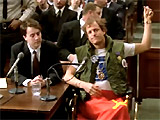 
|

|
Primal Fear (1996) In this dramatic mystery legal-thriller, ambitious, slick high-profile Chicago defense lawyer Martin Vail (Richard Gere) was hired (pro bono) to defend stuttering Kentucky altar boy Aaron Stampler (Edward Norton in his film debut) who was accused of viciously murdering Chicago's Archbishop Richard Rushman (Stanley Anderson) in his residence. Stampler was originally a homeless street kid that was taken in by the priest. The Archbishop was later revealed to be involved in sexual abuse and corruption of altar boys, including Stampler (a clear motive for revenge and murder). Early on, Vail witnessed how Stampler suffered from multiple personality disorder, confirmed by psychiatrist Molly Arrington (Frances McDormand). Stampler had two distinct personalities: a psychotic, violent, sociopathic, and dominant aggressive alter-ego named Roy, and a normal rational self named Aaron (who couldn't remember anything about Roy). It was a seemingly impossible case to win, since the evidence incriminated Stampler, and an insanity plea was not possible. The District Attorney was John Shaughnessy (John Mahoney), while the Assistant District Attorney prosecutor was Janet Venable (Laura Linney), Vail's ex-girlfriend, and the judge was Shoat (Alfre Woodard). Verdict: During one intense cross-examination in the trial, violent 'Roy' erupted from Aaron's personality and attacked Venable. Eventually, Vail was able to clear his client with the Judge's ruling of mental insanity, and Stampler was ordered to a maximum security mental hospital. The shocking twist of the film was revealed after the trial's conclusion. As Aaron congratulated his lawyer in his cell, he apologized with a stutter for injuring Venable's neck ("Will you t-tell Miss Venable I'm sorry? Tell her I hope her neck is OK"). It suddenly dawned on Vail that Aaron was uncharacteristically remembering what Roy had done, rather than blacking out. Aaron had unwittingly revealed that he was only pretending to be insane and had actually premeditatively murdered the priest ("...cuttin' up that son of a bitch Rushman? That was just a f--kin' work of art!") and his own teenaged girlfriend Linda (Azalea Davila) ("That cunt just got what she deserved"), whom the Archbishop had molested. Also, he admitted that Roy was his real personality (and in charge) and that "there never was an Aaron either, counselor." As Vail left the cell and courtroom, disgraced, devastated and disgusted, he heard 'Roy's' closing words to him: "We did it, man. We f--kin' did it. We're a great team, you and me. You think I could've done this without you? You're just feelin' a little anger here because you started to care about old Aaron, I can understand that, but - you know, love hurts, Marty." |

|

|
A Time to Kill (1996) An adaptation of John Grisham's 1989 best-seller (his first novel) reminiscent of To Kill a Mockingbird, Schumacher's compelling and racially-charged drama was about the trial of Southern black factory mill worker and father Carl Lee Hailey (Samuel L. Jackson). He was charged with the vengeful murder of the two white men who viciously raped and almost killed his 10 year-old daughter Tonya (Rae'Ven Kelly), believing "They deserved to die and I hope they burn in hell!" The two hard-drinking, foul-mouthed, white-supremacist rednecks: Billy Ray Cobb (Nicky Katt) and James Louis "Pete" Willard (Doug Hutchison) were shot and killed in the courthouse rotunda by Hailey - with many witnesses. Hailey was defended by novice, debt-ridden Southern white lawyer Jake Tyler Brigance (Matthew McConaughey) and his legal aide-clerk Ellen Roark (Sandra Bullock), a young idealistic Boston law student, in the small Mississippi town of Canton in Ford County. Brigance was opposed by brilliant, politically-ambitious and powerful prosecuting attorney Rufus Buckley (Kevin Spacey) who sought the death penalty, and the trial was presided over by Judge Omar Noose (Patrick McGoohan). During the lead-up to the trial, Brigance and his wife Carla Brigance (Ashley Judd) - and Ellen Roark - were threatened by the local Ku Klux Klan and one of its lead members, Freddie Lee Cobb (Keifer Sutherland), the brother of one of the victims. Verdict: In the final summation to the all-white jury, Brigance told the story of the little girl's awful experience (after the double rape and an attempted hanging, she was dumped in a nearby river). It was slowly and vividly told as the jurors closed their eyes to listen, to a ghastly recounting and its conclusion: "Can you see her? Her raped, beaten, broken body soaked in their urine, soaked in their semen, soaked in her blood, left to die. Can you see her? I want you to picture that little girl. Now imagine she's white." After tense deliberations, the jury voted to acquit Hailey. |
 
|

|
Amistad (1997) Spielberg's dramatic, lengthy epic about freedom and justice was the true story of America's slave trade, and the 1839 mutiny aboard the Spanish slave ship La Amistad traveling from Cuba to the US. The ship was loaded with valuable cargo - 53 kidnapped and chained slaves held by Spanish captors. The Africans had originally been captured in Sierra Leone (a British protectorate where slavery was outlawed), illegally brought by a Portuguese ship to Cuba, and then transferred to a Spanish ship for transport to the US. African Mende tribal leader Joseph Cinque (Djimon Hounsou) escaped from his chains, led a mutiny which killed all but two of the white Spanish captors, and directed the ship to sail back to Africa. Fooled by the navigators, they were captured off the NE US Long Island coast by the Navy, where the non-English speaking slaves were imprisoned, regarded as runaway slaves (and "property"), and charged with murder. During their initial trial in Connecticut, the slaves were defended in the test case by an African-American slave turned-abolitionist lawyer Theodore Joadson (Morgan Freeman), white colleague Lewis Tappan (Stellan Skarsgard) and naive attorney Roger Sherman Baldwin (Matthew McConaughey). The defense argued that the Africans (free in their own country) had been illegally seized to be sold in the US as "stolen goods," and acted in self-defense when they murdered their enslavers. Opposed was President Martin Van Buren (Nigel Hawthorne) who feared losing Southern votes during his re-election campaign if he supported the Africans' case. In fact, Van Buren's Secretary of State John Forsyth (David Paymer) argued that the slave "property" had to be returned to young Queen Isabella II (Anna Paquin) of Spain to honor a treaty between the two countries. However, the district court ruled in favor of the abolitionist and Africans' position. In early 1840, it ordered that the Africans be returned to their homeland by the US government. Eventually, the case was appealed to the US Supreme Court. Verdict: The 1841 case before the US Supreme Court, composed of Southern slave-owning judges, was a stirring battle of wits. Former President John Quincy Adams (Anthony Hopkins), now a Massachusetts Congressman, provided a passionate defense of the African captives (he called Cinque "the only true hero in this room"). He eloquently and controversially asserted the right of freedom of the individual: "The natural state of mankind is... freedom. And the proof is the length to which a man, woman, or child will go to regain it, once taken. He will break loose his chains. He will decimate his enemies. He will try and try and try against all odds, against all prejudices, to get home." He referenced the well-known words of the Declaration of Independence: "'All men...created equal,' 'inalienable rights,' 'life,' 'liberty,'" and then dramatically tore a copy of it in half. He then invoked the wisdom and spirit of the Founding Fathers to help make the decision, and then suggested that the court's ruling might provoke a civil war ("the last battle of the American Revolution"). The higher court affirmed the lower court's ruling that the Africans were entitled to take whatever legal measures necessary to secure their freedom, including the use of force. They were authorized to return to their homeland. |

|
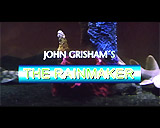
|
The Rainmaker (1997) This was another of John Grisham's courtroom dramas - a David vs. Goliath tale based upon his 1995 book (and adapted by director Coppola himself), and somewhat modeled after Otto Preminger's Anatomy of a Murder (1959). Recent naive, young, poor and idealistic Memphis law school graduate Rudy Baylor (Matt Damon), preparing for his Tennessee bar exam, was first employed by sleazy opportunist and ambulance-chasing injury attorney J. Lyman "Bruiser" Stone (Mickey Rourke). Rudy was assisted by para-legal researcher-attorney Deck Shifflet (Danny DeVito), who had flunked the bar exam six times. When 'Bruiser' was approached by the Feds and accused of racketeering, he had to flee town, so Rudy and the street-wise hustler Deck struck out on their own. In the drama's central medical insurance case and wrongful death suit, the two represented the family of poor 22 year-old Donny Ray Black (Johnny Whitworth) who was afflicted with untreated terminal leukemia, because his claim for medical insurance was callously denied. The corporate policy was to avoid covering the expenses involved for a life-saving bone marrow transplant. The family, Donny Ray's mother Dot (Mary Kay Place) and his taciturn father Buddy (Red West) were suing the company, Great Benefit, following the death of Donny (who had filed a video deposition). They battled the corrupt insurance company's lawyers, headed by high-priced, malevolent Leo F. Drummond (Jon Voight), who was siding with the company's corrupt CEO Wilfred Keeley (Roy Scheider). The judge presiding in the case was Judge Tyrone Kipler (Danny Glover), an ex-civil rights attorney who openly sympathized with novice Rudy. Verdict: Due to his self-determination and persistence during the high-profile case, even though some of the testimony of key witness Jackie Lemanczyk (Virginia Madsen), a former Great Benefit employee, was dismissed, Rudy refused to settle with Drummond. He was able to convince the court and jury to award substantial monetary damages ($50 million) to the Blacks. In the aftermath of the decision, however, CEO Keeley stole the failing company's remaining money, declared bankruptcy for Great Benefit, and fled the country. Rudy's win was a moral victory, but there were no damages to be paid to the claimants. |
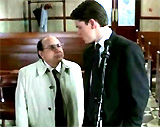 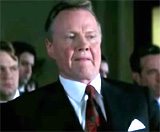 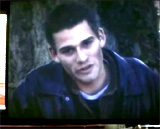 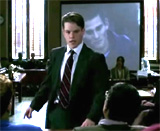 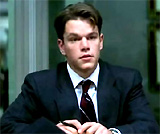
|

|
Red Corner (1997) Director Jon Avnet's mystery thriller was controversial for being critical of the draconian Chinese government at the time. Richard Gere starred as American businessman-attorney Jack Moore from LA working with the Chinese government regarding a billion-dollar satellite communications and entertainment deal. One evening while in Beijing and partying in a Western nightclub with his friend Lin Dan (Byron Mann), the son of a Chinese business official, he met exotic runway model Hong Ling (Jessey Meng), the daughter of a high-ranking Chinese military official General Li Cheng (Tzi Ma), and had passionate one-night-stand sex with her. The next morning after awakening, he was charged with her rape and murder (by stabbing), and incarcerated (and abused physically) in a Kafkaesque prison. Due to his arrest, the business deal went to Moore's German competitor, Gerhardt Hoffman (Ulrich Matschoss). His court-appointed Chinese defense lawyer Shen Yuelin (Bai Ling in her first lead role in a US film) at first insisted that her client quickly file a guilty plea, hoping he would receive leniency for confessing. Moore's lawyer warned: "If you plead not guilty, you will be sentenced to death. And, unlike in your country, Mr. Moore, sentences are carried out within a week. You will be shot, and the cost of the bullet will be billed to your family." Verdict: The court trial was presided over by strict Chinese judge Chairman Xu (Tsai Chin). However, with just a week to investigate the case, Moore and Yuelin soon uncovered evidence of the frame-up, conspiracy and corruption, and they exposed multiple judicial, civil and political abuses. The film was mostly an excuse to attack the harsh Chinese criminal/legal system. Model Hong Ling was discovered to be complicit in Moore's frame-up (he was chloroformed after having sex), but when she resisted going further with the plot against Moore, she was killed. The killer was revealed to be Huan Minglu (Roger Yuan), hired by spurned Lin Dan who used to be Hong Ling's lover (she had told him: "Our relationship is over"). In the film's stirring climax in the courtroom, as the smug Lin Dan was leaving the courtroom and Moore was being dragged off, Lin Dan was vengefully gunned down outside the doors by the dead girl's enraged father. The Chairman ruled: "The guilty parties have now confessed to the crime of conspiracy and murder, namely, the death of Hong Ling" - and Moore was subsequently released. |
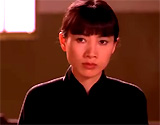 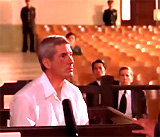 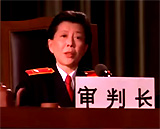 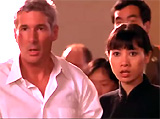 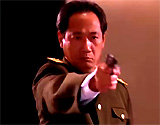
|

|
A Civil Action (1998) This fictionalized dramatic courtroom film was based on a true case of corporate environmental (water) pollution in the early 1980s. In the film, successful eligible bachelor and personal-injury lawyer Jan Schlichtmann (John Travolta), part of a respected law firm in Boston and known for being an "ambulance chaser," agreed (pro bono) to take on a class action civil law-suit involving corporate irresponsibility and industrial environmental damage. It would prove to be very expensive ($1.4 million) to investigate the wrong-doing, and Schlichtmann's law firm steadily marched toward bankruptcy. Two large corporations, the chemical giant W.R. Grace and the giant food conglomerate Beatrice Foods - linked to a local tannery (a leather production factory run by John Riley (Dan Hedaya)), were accused of leaking cancer-causing toxic chemicals into the water supply of the town of Woburn, Massachusetts. The pollution caused leukemia among several working class families (with about a dozen dead children), including the family of Anne Anderson (Kathleen Quinlan). Schlichtmann wanted to prove the company's guilt (with an apology), have the companies agree to decontaminate the area, and offer compensatory damages to his clients. Beatrice Foods was defended by crafty, eccentric veteran Southern lawyer Jerome Facher (Robert Duvall), while W.R. Grace (headed by CEO Al Eustis (Sydney Pollack)) was represented by William Cheeseman (Bruce Norris). The case was presided over by pro-business Judge Walter J. Skinner (John Lithgow). The prosecution team - aiding Schlichtmann - included frazzled legal analyst-accountant James Gordon (William H. Macy), Tony Shalhoub (Kevin Conway) and Zeljko Ivanek (Bill Crowley). Verdict: On the stand, Al Love (James Gandolfini), a worker at the W.R. Grace site, testified, as did John Riley, who perjured himself. It was tough for the defense to battle the two giant corporations. Although intimidated, Schlichtmann's team stubbornly refused any lesser settlement offers ($20 million). The lengthy trial ended with the case dismissed against Beatrice, and a small settlement with W.R. Grace that wasn't sufficient to cover the costs of the trial or compensate the families. The settlement did not include an apology nor the promise to clean up the mess. In the film's epilogue, working by himself, Schlichtmann appealed the case to the EPA (Environmental Protection Agency), which later forced the companies to pay millions for clean-up, including an apology. It took him several years to pay off all of his personal debts. Since the celebrated case, he took on another polluted water case. |
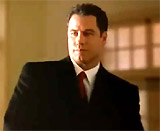
|

|
Snow Falling on Cedars (1999) Based on the 1994 novel by US author David Guterson, this dramatic murder mystery (that reflected anti-racial prejudice at the time) was set in the post-WWII mid-1950s on a fictional island in the northern and coastal Puget Sound region of the state of Washington. Japanese-American Kabuo Miyamoto (Rick Yune) was accused of murdering white commercial fisherman Carl Heine, Jr. (Eric Thal), who was found drowned in his fishing nets with a serious head wound. His trial was held during a snowstorm, and the case was covered by WWII Marine Corps veteran Ishmael Chambers (Ethan Hawke), the owner-editor of the local San Piedro Review. Chambers was one-armed as a result of the Battle of Tarawa. Complicating matters, since high school days, Chambers had long been the clandestine lover of Kabuo's wife, Hatsue (Youki Kudoh). The trial's prosecutor was Alvin Hooks (James Rebhorn), assisted by the town sheriff Art Moran (Richard Jenkins), while the defense was handled by elderly Nels Gudmondsson (Max von Sydow). The judge in the case was Judge Fielding (James Cromwell). Verdict: During the trial, Carl's German-American mother Etta Heine (Celia Weston) testified about racist prejudice as a factor in the murder. Ironically, Kabuo had served during the war in the 442nd Regimental Combat Team and was highly-decorated. Another major subject of contention and dispute was the sale of land (for growing strawberries) between the Heine and Miyamoto families. As a result of a personal investigation by Ishmael, he discovered that Carl had not drowned as a result of foul-play, but was thrown from the masthead onto his boat deck and then overboard by the tremendous wake produced by a passing freighter in the shipping channel. Gudmondsson delivered an impassioned closing argument that Kabuo was the victim of anti-Japanese prejudice. Charges against Kabuo were dismissed after Carl's death was ruled accidental. |
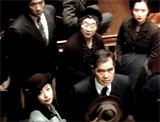 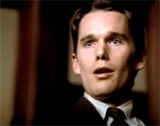 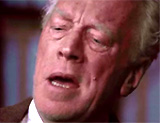
|